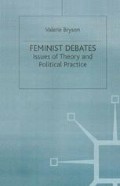Abstract
Feminist theory has never been a united body of thought. Its many strands have evolved from a wide range of ‘malestream’ theoretical perspectives, and also from the diverse experiences of different groups of women. By the 1980s, many writers identified liberal, socialist/Marxist and radical feminism as its three main branches. Since then, many other categories have been identified: most frequently black and post-modern feminism, but also lesbian feminism, cultural feminism, standpoint feminism, global feminism, anti-racist feminism, disability feminism, power feminism, victim feminism and new feminism. Such classifications are to some extent artificial, and can represent an attempt to impose order upon fluid, interlocking and interactive ways of thinking which, by treating different approaches as competitive rather than complementary, restricts the free development of ideas. Nevertheless, a provisional identification of theoretical starting-points can help to clarify debates, disentangle arguments and expose contradictions. Although this chapter eschews definitive labels, it does, therefore, represent an attempt to identify key strands in terms of the organising principles and theoretical assumptions that underlie political debate.
Preview
Unable to display preview. Download preview PDF.
Editor information
Copyright information
© 1999 Valerie Bryson
About this chapter
Cite this chapter
Bryson, V. (1999). Feminist theories today. In: Campling, J. (eds) Feminist Debates. Palgrave, London. https://doi.org/10.1007/978-1-349-27505-2_2
Download citation
DOI: https://doi.org/10.1007/978-1-349-27505-2_2
Publisher Name: Palgrave, London
Print ISBN: 978-0-333-61340-5
Online ISBN: 978-1-349-27505-2
eBook Packages: Palgrave Social & Cultural Studies CollectionSocial Sciences (R0)

